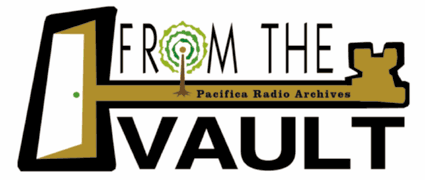On this edition of From The Vault, we pay tribute to a social activist who made Berkeley her home and Pacifica Radio KPFA in Berkeley the media outlet for her work, Frances Emley. Emley passed on December 1, 2015 at the age of 84.
Born in 1931 in West Virginia, Frances Emley moved to Michigan to earn a Master’s Degree in Library Science get married and have two daughters, before making the San Francisco Bay area her home in the late 1960s.
Here is an excerpt from the Berkeleyside online newspaper who wrote a piece honoring her.
“In the early 1970s, anti-war protesters at Stanford University inspired Frances to pick up a tape-recorder and craft her first radio news report for KPFA. She had no previous radio experience, but wanted people to hear alternative viewpoints in the news. Soon, she was splicing large reels of tape on her kitchen table, editing poignant interviews about farmworkers using the short hoe, Chilean victims of torture, American incarcerated youth, veterans suffering from Agent Orange exposure and Native Americans trying to secure land rights.
Her programs, still archived at KPFA and Pacifica Radio, raised awareness about the plight of others suffering and the importance of speaking out. She loved a story of rebellion.”
Here at the Pacifica Radio Archives, we honor Frances Emley by presenting one of her programs, El Cortito : the story of the legal battle to ban the use of the short hoe on throughout the farms of California.
This program, produced in 1974, is the perfect example of Pacifica’s concept of radio for the common good of the community. Frances selected a topic that affects us all: The work that puts food on our plates. She focused on an aspect of farming that few of us are aware of, but had horrible consequences to the farm worker stooping in the fields unnecessarily for up to 16 hours a day that commonly resulted in spine and lower back injuries.
Thanks to the space that Pacifica provided and the work of Frances Emley and her colleagues including Paul Richards, her efforts resulted in a change in public policy. In 1975 The California Supreme Court ruled on the use of the short hoe in farmwork.
Court Ruling:
“We hold that any hand tool which causes injury, immediate or cumulative, when used in the manner in which it was intended to be used may constitute an “unsafe hand tool” within the meaning of the regulation. If the short-handled hoe is so designed that it can be used by the worker only in a stooped posture that is dangerous to his health it could be found to be an “unsafe hand tool.”
In 1975, the California State Supreme Court ruled that it was an “unsafe hand tool” and, therefore, banned under California state law.
Thank you, Frances Emley, for your good conscience and great work.
There are many other Frances Emley productions in the Pacifica Radio Archives–simply go to www.PacificaRadioArchives.org



